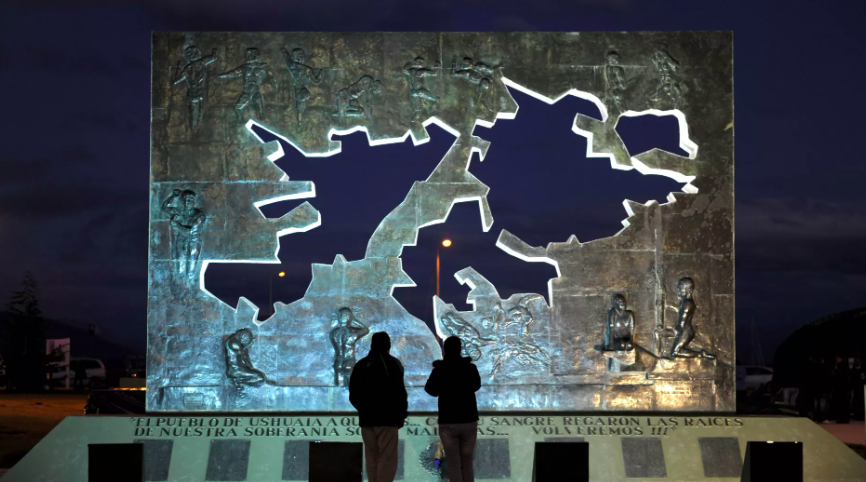Argentine Foreign Minister Santiago Cafiero informed his UK counterpart James Cleverly of the cancellation of a pact signed with the government of Mauricio Macri (2015-2019) that envisaged the possibility of the British exploiting the natural resources of the disputed Falkland Islands.
It “informs the Government of the United Kingdom of Great Britain and Northern Ireland that the Joint Communiqué of September 13, 2016, known as ‘Foradori-Duncan’, and its effects, are terminated,” the Foreign Ministry announced in a statement.
In the framework of the summit of foreign ministers held by the G-20 in India, the Argentine minister informed the British Secretary of State for Foreign Affairs, Commonwealth and Development that a joint statement signed on September 13, 2016, at the UK Embassy in Buenos Aires by then Deputy Foreign Secretary Carlos Foradori and his British counterpart Alan Duncan will no longer govern.

Based on that document, the two diplomats expressed their openness to the possibility of establishing direct flights between the Malvinas and third countries, with a stopover in Argentine territory.
The text, which did not pass through Congress, also included the will of the governments of Mauricio Macri and the Prime Minister of the time, Theresa May (2016-2019), to deepen the economic development of the Malvinas Islands concerning “trade, fishing, navigation and hydrocarbons”.
Cafiero noted that this pact is incompatible with Resolution 31/49 of the United Nations General Assembly, which recommends the two parties refrain from adopting decisions that involve unilateral modifications in the sovereignty dispute that both countries maintain over the archipelago.
PROPOSAL FOR A NEW NEGOTIATION PROCESS
At the same time, the Argentine Foreign Minister proposed to his British counterpart to initiate a new process of negotiations, in the spirit that prevailed after the approval of Resolution 2,065 of the United Nations General Assembly passed in December 1965, “which made it possible to address all issues of mutual interest, including the question of sovereignty”.
With that predisposition, the South American nation suggested holding a first meeting at the United Nations headquarters in New York, given “the need to adopt a new bilateral agenda related to the South Atlantic”.
In this new negotiation process, Argentina requests that the air and maritime connectivity of the Malvinas Islands and the surrounding maritime areas with the Argentine mainland be addressed.
The country also invites to establish measures to guarantee the way of life of the archipelago’s inhabitants to promote the development of cultural, economic, health, and educational links.
Argentina also suggests implementing guidelines to preserve the islands’ natural resources with respect to the stipulations of the resolutions of the General Assembly and the United Nations Decolonization Committee, which entails the demilitarization of the areas under sovereignty dispute.
The Argentine Foreign Ministry stressed its “willingness to give continuity to the bilateral relationship in all areas in which progress has been made and in which courses of action have been proposed and in which no divergences have arisen”.
In particular, Argentina showed interest in continuing with the humanitarian mission of identification of Argentine soldiers buried in the Malvinas Islands after the 1982 war that confronted both countries, “and whose third stage is in the final process of analysis to reach an agreement”, highlighted the Ministry of Foreign Affairs.
Duncan, the British vice-chancellor between 2016 and 2019, claimed in a memoir that Foradori was in such a state of inebriation during the negotiations of the agreement that he did not remember anything the next day about the details.
“Foradori just phoned to say he was so drunk last night that he couldn’t remember all the details,” the then British ambassador to Argentina, Mark Kent, told Duncan, according to his publication ‘In the thick of it,’ published last year.
Argentina claims to be able to operate a flight to the Malvinas Islands (Falklands, for the British) from the Argentine mainland through its flag carrier, Aerolineas Argentinas.
The South American country had claimed sovereignty over the archipelago since 1833 when the United Kingdom occupied the islands.
Since then, both countries have maintained a dispute over the sovereignty of the region, which led in April 1982 to the Argentine dictatorship (1976-1983) trying to recover them through a war that ended on June 14 with the Argentine defeat and with almost 1,000 deaths between both sides during the armed conflict alone.
The United Kingdom and Argentina resumed diplomatic relations in February 1990, during the administration of former President Carlos Menem (1989-1999).
With information from Sputnik

